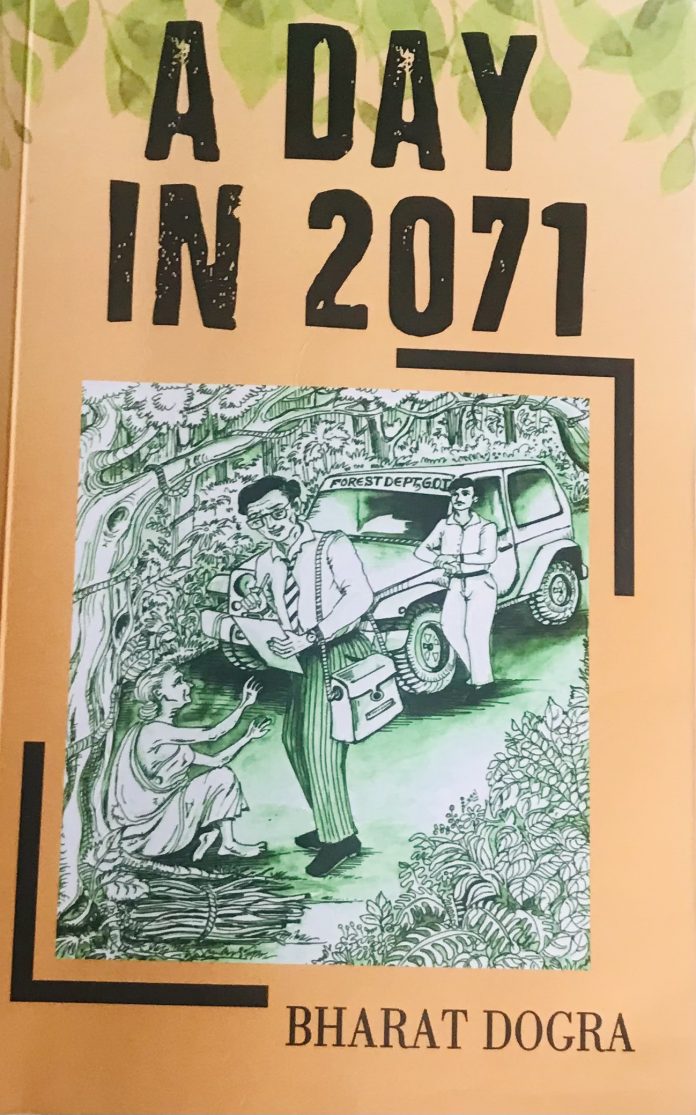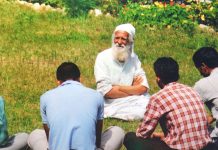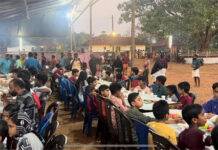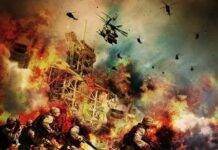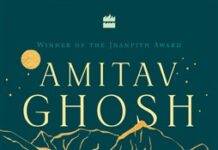BOOK REVIEW
Bharat Dogra, A Day in 2071: A Collection of Stories and Novellas, Saptarishi, New Delhi, 2022, pp. xiii+246, price: Rs. 399/
I have been reading Bharat Dogra’s essays and columns in a spectrum of newspapers and magazines for quite some time. What fascinates me is his commitment, or his creative urge to communicate with his readers, and make them see the discontents of the age we live in—from the virus of communalism to the violence implicit in what techno-capitalists regard as ‘development’. In the age of instantaneity when the seductive logic of glossy consumerism and hyper-real stories of celebrities colonize our consciousness, Bharat Dogra is a refreshing departure. He continues to carry the lamp of truth; he does not want us to forget the need for emancipatory social movements for resisting this decadence, and creating an ecologically sensitive, inclusive and egalitarian society.
This time as I begin to read his new book, I begin to see his literary sensibilities. In fact, this collection of stories and novellas can be seen as a site of confluence—political sociology merging with literary imagination. Even though the fear of dystopia—a robotic/violent society spreading the chains of surveillance everywhere—is real, Dogra refuses to be a pessimist. He sees the possibility of new movements; he finds young idealists who have not yet lost their dream of an egalitarian and humane world. This continual play of darkness and light, or authoritarianism and democratic resistance, or harsh reality and longing for the light of illumination is a distinctive feature of this volume.
The liberating power of literary imagination lies in the fact that it enables one to visualize what the empiricism of social sciences fails to do. Yet, this imagination is not unreal; in fact, it is through the metaphor of this imagination that Dogra critiques the prevalent system, and inspires his readers to think of yet another way of seeing the world.
Think of our techno-managers who celebrate the gospel of limitless growth, and believe that if you and I alter our ways of living, and ceaselessly strive for the ‘having mode of existence’ by buying/consuming/desiring more, none can stop our growth—the mathematics of GNP! But then, Dogra finds an unknown tribal man in an unknown Indian village. And this simple soul guided by his calmness and complete merger with the musical flute defies this logic of consumption and growth. Let me quote from the story: “ GNP and the Tribal’s Flute”:
It was a very sweet tune without doubt and even the arrogant expert was reluctant to disturb the man. He allowed the flute song to be over, then went up to the man.
‘Hey, you lazy bones. What are you doing here getting so musical in the morning? Don’t you know this is the rush hour when everyone is busy earning and here you sit lazily under a tree? It is because of people like you that the country cannot progress. The growth of GNP is harmed by such attitudes, and you must understand this.’
The man was puzzled. He could not understand. After some reflection he murmured, ‘Well. My brother has gone to the farm and I have brought the animals for grazing. What else is there to do?’
‘You could have gone to the city to earn extra, or at least you could have gone to the nearby quarry. Haven’t you seen the style in which people in the city live? Don’t you want your children to be like their children? Or even look at your village’s Ramesh. Only yesterday an official told me about his progress. After he returned from city, hasn’t he got much ahead of lazy blokes like you? Don’t you want to get ahead of the others?’
The man was still puzzled. He asked, ‘ But how will this help me or anyone else?’
The official was getting exasperated. He said, “Why?’ If you earn more money, then you can save more. You will have a bank balance. And then you can just throw back your hands and relax.’
‘But this is precisely what I am doing now’, the tribal said, as he picked up his flute.
Yes, Dogra can hear this sort of illuminating voice that defies the instrumental logic of this techno-economic system. Is it, therefore, surprising that he tells us the story of the old woman in the forest? The wisdom of the subaltern awakens me. I begin to realize the meaning of ‘history from below’ when she urges the government official—
If you know the government and it really listens to you, then kindly tell the government that it can help us the most by simply going away from here.
Indeed, the short stories Dogra has offered us in this book shock us, touch us, and awaken us. We realize why fear—the fear of the constructed ‘enemy’—becomes ‘a parable for our times’; and how it helps our authoritarian masters to transform us into docile objects. And likewise, as I read his another amazing story “ Mansion”, I realize that it is like redefining the tales of Panchatantra in our times. The trap of greed, or the craving for some sort of hypothetical happiness in the act of consumption, and the ultimate realization of the futility of this race—yes, Dogra’s narrative reveals the hollowness of the mythologies of modern existence.
When the power of imagination enables him to allow Mahatma Gandhi and Bhagat Singh to meet in Heaven; or when Gandhi and Einstein conversed in Heaven, how do you and I respond? Is it some sort of magical illusion? Or, is it symbolic—a new language through which the author is reminding us of our fall—the way we have deviated from the ideals Gandhi, Bhagat Singh and Einstein strove for? Is it Dogra’s urge to activate our conscience so that we can continue to rediscover them, nurture the art of resistance, and move towards a compassionate world? Let us reflect on the statement that Gandhi and Einstein prepared, and thought of sending to Earth—our Earth tormented by war, violence and climate change:
Progress can take place only if all weapons of mass destruction are eliminated, if the arms race and all future wars are banned and avoided completely. While this is important in itself this is also important to create those conditions in which the entire humanity can cooperate to check climate change and other environmental problems. And this should take place in conditions of increasing justice, equality and democracy because this alone can create the conditions for the enthusiastic participation of people without which success is not possible.
It is equally important to acknowledge that the kind of characters Dogra has created in his stories and novellas look very real. We seem to have seen them and interacted with them. As I read his novella “ We Shall Overcome”, it does not become difficult for me to accept that Preeti and Jatin are like those young idealists—fearless , intelligent, politically aware and energetic, I have seen in different social movements; I have seen them at Shaheen Bagh; I have seen them with Medha Patkar; and I have seen them in universities. And Dogra, it seems, has brought them back in his novella as he narrates the tales of ‘Youths for Justice’—the organization that could acquire the courage to debunk the ‘achievements’ of the “Shinning Green”—an apparently gorgeous housing complex with inner cleavages, and fight for people’s rights and safety. Yes, we are familiar with the unholy alliance of the real estate mafia, the corporate media and the political class. Visit Noida and Gurugram, and see the inner ugliness that many of these gorgeous gated communities with their glossy advertisements seek to hide. And yes, Dogra’s social realism could also rediscover the likes of ‘senior advisors’ like Imtiaz Ali and David Paul. This is a novella of hope and endurance. What is equally important to note is that in his work birds, trees and animals are endowed with consciousness and agency. For creating an environmentally sustainable world, should we learn from them? I feel like quoting a part of conversation that took place in a meeting of birds, animals and insects in the forest of “Shinning Green”:
Even if, and there is a big if, some safety concerns of Shinning Green are taken care of, it is not necessary that we’ll be protected. Our safety, alas, can be threatened even by good persons such as members of Youths for Justice. Our safety will be ensured only when human beings realize that that their role on earth is a protective one, to be protective among themselves and to be protective to all forms of life. This is the only legitimate role for a species that has been given overwhelming power over all other millions of species on earth.
And finally, I ought to refer to his another novella “A Day in 2071”. Yes, as the title suggests, it is the projection of the future. Well, possibly, the future seems to be bleak. Be it the life-threatening pandemic or the devastating war, and the horror of climate change or the rising authoritarianism amid the sophisticated technologies of surveillance—the year 2071, one feels compelled to think, would take us to a dystopian world. What characterizes this novella is Dogra’s ability to see the light of resistance and hope even amid some sort of techno-fascism. In a way, Cyrul Lee of TT 77 (Top Luxury Top Security Enclaves) is an embodiment of this violence. He is absolutely dehumanized. He abhors all egalitarian humane relationships. And then, for the subaltern and the oppressed, there is CC Area (Captive Territory of Controlled Citizens). In a way, the relationship between these two domains is like the relationship between the colonizer and the colonized. Yet, Dogra can create a character like Anita—the embodiment of love and compassion, and courage and resistance. This novella is about the triumph of life over death, ethics of care over violence of greed, humanism over technocracy, and Anita’s feminine power of moral/spiritual strength over Cyrul’s brute/toxic masculinity.
Dogra doesn’t hesitate to celebrate the possibility or promise called Anita, especially at a time when the devil forces of technocracy, militarism and authoritarianism are causing widespread violence, taking us to a ‘risk society’, and dehumanizing the cultural domain. Yes, as an empathic reader, I understand the significance of Bharat Dogra’s prayer:
As the writer of a story of only one day I must depart now.
But if you happen to meet Anita tomorrow or the day after please do tell her that I prayed for her before leaving.
I do not know whom I addressed the prayer, but please tell her I prayed nevertheless.
She will understand.
Avijit Pathak writes on culture and education.

